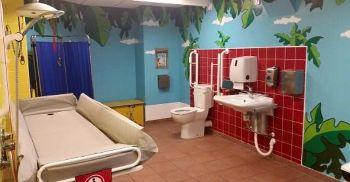
Published on: 16/03/20
The Chancellor’s first Budget set out funding to improve public toilet facilities, and law changes that will see Changing Places loos in every new public building.

Published on: 16/03/20
Chancellor Rishi Sunak pledged £30 million for fully accessible Changing Places toilets in Thursday’s budget. He also promised to change the law so new public buildings get Changing Places toilets, which have hoists, adult-sized changing benches and extra room, so parents and carers of disabled children and adults do not have to change them on the floor.
The Treasury set out in the Budget that “the government is determined to see greater provision of Changing Places toilet facilities in new and existing buildings. These facilities are designed to provide sufficient space and equipment for people who are not able to use the toilet independently.”
The funding boost will mean more disabled people can go out, shop and socialise without worrying about a lack of toilets. In an official statement the Changing Places Consortium said: “We strongly welcome this news and know what a huge impact it will have for every person that depends on these vital toilets to live their lives without worrying when they will be able to access a toilet that meets their needs.”
The Changing Places Consortium provides regular updates on new Changing Places toilets. Last month (February 2020), 19 toilets were registered, 9 being in Tesco stores. The consortium also provides a Changing Places Location Map.
While Thursday’s budget was good news for Changing Places, the Disabled Children’s Partnership expressed disappointment with the lack of provision for social care for children with disabilities.
The DCP responded: “The Chancellor has not taken the opportunity of his first Budget to address the crisis in support for disabled children and their families. We are calling on the government to use the promised increases in public spending in the spending review later in the year to increase health and social care support for disabled children and to introduce a dedicated Disabled Children’s Innovation Fund.”